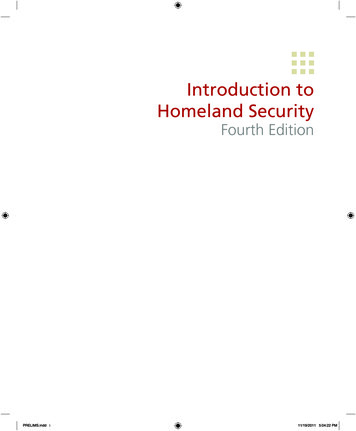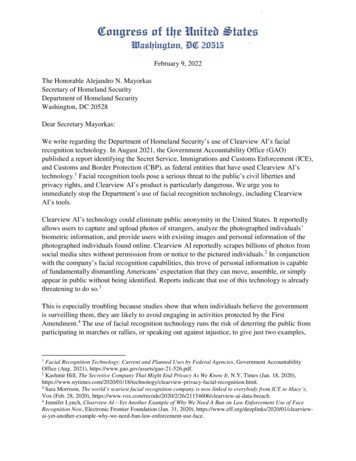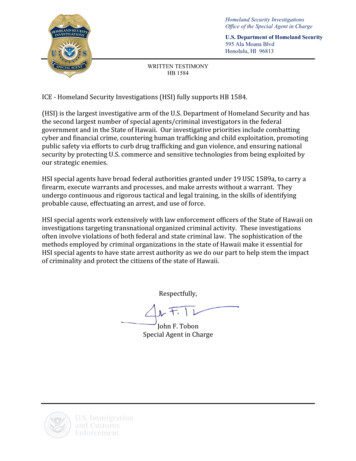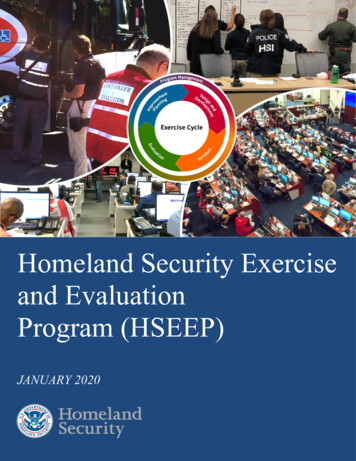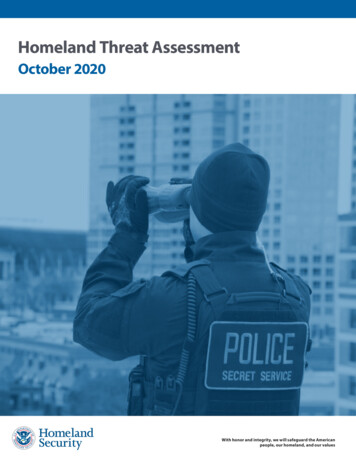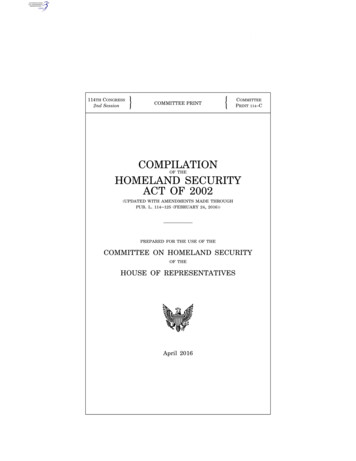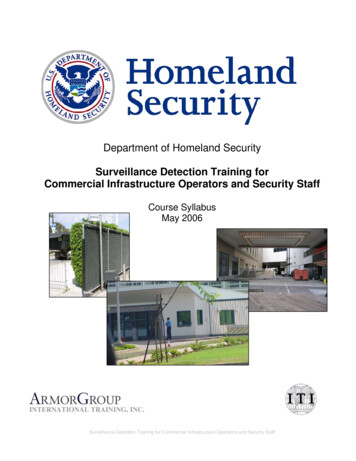
Transcription
Department of Homeland SecuritySurveillance Detection Training forCommercial Infrastructure Operators and Security StaffCourse SyllabusMay 2006INTERNATIONAL TRAINING, INC.Surveillance Detection Training for Commercial Infrastructure Operators and Security Staff
TABLE OF CONTENTSBackgroundScopeLevel of TrainingCourse DescriptionInstructor/Student RatioProgram Evaluation StrategyParticipant Resource Requirements3333444Module 14Course Overview/Objectives/Handouts/LogisticsPre-course AssessmentModule 24Lesson1 (part 1)Attack Methodology/Attack Cycle/Pre-incident IndicatorsLesson 1 (part 2)Vulnerability AnalysisLesson 2Vulnerability Analysis Practical ExerciseModule 35Lesson 1Hostile Surveillance Positions (Red Zone)Lesson 2Red Zone Design Practical ExerciseRed Zone Exercise DebriefLesson 3Surveillance Detection (SD)Lesson 4Surveillance Detection Position Practical ExerciseSD Exercise DebriefModule 46Lesson 1Developing the Surveillance Detection PlanLesson 2Observation and ReportingModule 56Critical Infrastructure Buffer Zone Capstone ExerciseExercise Debrief with Role PlayersSurveillance Detection Training for Commercial Infrastructure Operators and Security Staff2
Post-course AssessmentBackgroundThis course in Surveillance Detection (SD) Plans and Operations is designed to provide a guidelinefor mitigating risks to critical infrastructure. Instructors explain how this protective measure can beapplied to detect and deter potential threats to critical infrastructure and key resources (CI/KR) as wellas the fundamentals for detecting surveillance activity. Students apply skills such as Vulnerability andRed Zone Analysis, Surveillance Detection and Observation and Reporting during practical exercisesthroughout the course.Surveillance Detection Training forCommercial Infrastructure Operators and Security StaffScope of Training and Course Goal:Provide students with the knowledge to develop a Surveillance DetectionPlan.Course Learning Objectives:1. Employ fundamentals of Surveillance Detection related to afacility.2. Develop actionable Surveillance Detection plan.3. Report observations with necessary details to aid securityofficials in their efforts.Level of Training:Planning/ManagementCourse Description:This Surveillance Detection course designed for commercial infrastructure operators and securitystaff provides a foundation for developing and applying plans which include the fundamentals ofSurveillance Detection, recognizing the indicators of an imminent attack, implementing appropriateresponses and reporting observations with the necessary details to aid security officials. The courseis broken down into learning modules that cover the following topic areas:Vulnerability AssessmentsIdentifying Hostile Surveillance positions (understanding Red Zone)Employing the fundamentals of Surveillance DetectionDeveloping plans and procedures, which include resourcing, reporting and response policies toobserve and report suspicious individuals and activity around CI/KR.Students attend classroom seminars for each module of instruction, which cover the topics listed inthe table of contents. Each module of instruction incorporates practical hands on learning exercisesto reinforce concepts and skills taught. The course culminates with a capstone exercise.Surveillance Detection Training for Commercial Infrastructure Operators and Security Staff3
Each day of instruction is a full day. Students are given a lunch break, which varies in timedepending on daily activities.Instructor to Student Ratio for all Modules: 2:25Program Evaluation Strategy:A training evaluation model is used to monitor program effectiveness. A Level 1 exit questionnaire isused to capture participants “reaction” to training. A Level 2 pre and post assessment is used tocompare/contrast entry to exit level knowledge.Participant Resource Requirements:Student HandoutsPen/PencilPaperDay 1Module 1: Course OverviewDuration: 0830-0930Description:This module of instruction introduces students to the teaching methodology and background for thecourse. The daily routine and logistics requirements are established as well as individualresponsibilities throughout the course. The course pre-assessment is administered during thismodule. Student handouts are distributed.Purpose:1. Outline course of instruction, teaching methodologies, daily routine and course logistics2. Determine baseline knowledge level of each studentModule 2: Attack Methodology/Attack Cycle/Pre-incident Indicators/Vulnerability AnalysisDuration: 0930-1630Description:This module of instruction is comprised of two lessons. The first lesson is broken into 2 parts andtakes two to three hours to complete. Lesson 1, part 1 includes facility attacks and pre-incidentindicators. Lesson 1, part 2 focuses on Vulnerability Analysis. Lesson two is the practical exercise.Students are briefed on the exercise and then spend the next several hours conducting aVulnerability Analysis. The last segment of class is the exercise debrief.Module 2 Terminal Objective: Following Lesson 1, parts 1 and 2 and given the exercise worksheeton page eight of the student guide, students conduct a Facility Vulnerability Analysis (FVA) and briefthe instructors on their findings (practical exercise).Surveillance Detection Training for Commercial Infrastructure Operators and Security Staff4
Enabling Objectives:Lesson 1/Part 1:1. Recall terrorist attack trends, techniques/methods2. Recall the five defensive measures3. Recall the three rings of security and explain the importance of each.4. Recall the 7-step attack cycle5. Describe the detectable points (weak links) within the attack cycleLesson 1/Part 2:1. Recall the 8 components of a vulnerability analysis2. Recall predictable activities associated with a facilityLesson 2:Conduct a Facility Vulnerability Analysis (FVA) and brief the instructors on the findings.Day 2Module 3: Hostile Surveillance Positions (Red Zone) and Practical Exercise/Surveillance Detectionand Practical ExerciseDuration: 0830-1630Description:This module of instruction focuses on the fundamentals of surveillance detection, hostile surveillancepositioning (red zone) and SD positioning. The module is comprised of four lessons. Lesson oneclassroom presentation is one-hour and covers Hostile Surveillance Positions (Red Zone). Lessontwo; practical exercise in support of this presentation is scheduled for two hours and the debrief isscheduled for one hour. Lesson three classroom presentation, Surveillance Detection, is one hour.Lesson three; practical exercise in support of this lesson is scheduled for two hours and the debrief isscheduled for one hour.Terminal Objective: Following the classroom presentations and given the exercise worksheet in thestudent guide, identify Surveillance Detection Positions.Enabling Objectives:Lesson 1:Recall the basic requirements of Red Zone designLesson 2:Design a Red Zone related to a specific location (practical exercise)Lesson 3:Recall the basic requirements of surveillance positionsLesson 4:Select SD positions in support of a specific location (practical exercise)Surveillance Detection Training for Commercial Infrastructure Operators and Security Staff5
Day 3Module 4: The SD Plan and Observation and ReportingDuration: 0830-1130Description:This module of instruction takes place in the classroom and is divided into two separatepresentations. Lesson one is a 1-hour classroom presentation focusing on the importance ofdeveloping a Surveillance Detection Plan. Lesson two is a classroom presentation and practicalexercise designed to help students hone their observation and reporting skills. Lesson twopresentation is brief. Students spend the better part of the class period participating in theobservation exercise.Terminal Objective: Using the information gathered, develop a Surveillance Detection Plan.Enabling Objectives:Lesson 1:1. Recall the key elements of facility SD planning2. Recall the key questions for facility SD planningLesson 2:Demonstrate the ability to observe and recall details of appearanceModule 5: Capstone ExerciseDuration: 1130-1730Description:This module of instruction is based upon work accomplished during the previous modules ofinstruction. Students apply what they have learned in a validation exercise scenario working againstrole players. Exercise debrief and post course assessment take place immediately following theexercise.Purpose: Ensure each student has the knowledge, skills and abilities to detect surveillanceTerminal Objective:Detect surveillance using the methods and techniques learned throughout the courseEnabling Objective:Working against role players and given the information collected throughout the duration of thecourse, detect and accurately report surveillance activities related to a designated facility.Conclusion:Review & Administer Post-course AssessmentStudents complete course critiqueGraduation/Certificate PresentationSurveillance Detection Training for Commercial Infrastructure Operators and Security Staff6
Surveillance Detection Training for Commercial Infrastructure Operators and Security Staff 3 Post-course Assessment Background This course in Surveillance Detection (SD) Plans and Operations is designed to provide a guideline for mitigating risks to critical infrastructure. Instructors explain how this protective measure can be applied to detect and deter potential threats to critical .
